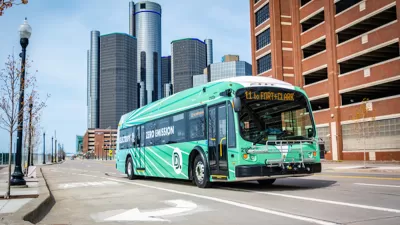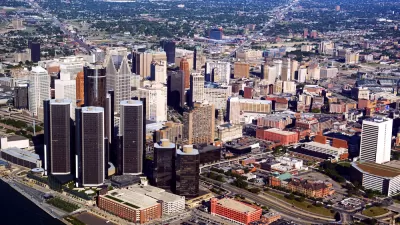Detroit is a city of borders: international borders, borders between cities and not-cities, and borders between the success of the past and the uncertain future, writes Jerry Herron in this essay for Places.
Herron explores Detroit's transition from a "city" to something else, something indicative of the global urban transformation in this first of a three-part series on the current state of the city.
"Detroit may be emptied out, but it is hardly over, nor will it be any time soon, precisely because of the questions that this city/not raises. What could have happened here? Does it have anything to do with the rest of America? Such questions are particularly pressing just now, as the world's population - at some point in 2008 - crossed a border never yet traversed by humans, with the majority of us becoming urban for the first time in history.
And that is just where Detroit's relevance lies. It is not only the busiest border crossing in the United States - literally - thanks to the volume of Canadian–American trade that passes through by water and rail and highway, but the busiest border in another, perhaps more crucial sense. Detroit sits precisely at the border of city and not-city; its condition renders the conflict between the natural world and the built environment in a specially forceful way, as Solnit points out. Here, the fearful energy released by a city in decay raises questions not only about the economic and governmental systems that produced Detroit (and America), but also about the humanity of citizens so transformed by urbanism that they can visit upon each other all the miseries and cruelty locally deployed. It's enough to make a person wonder, and especially to make Americans wonder, and maybe the rest of the world wonder too, as we all verge on a global urbanism and the city/not opposition achieves universal relevance. We wonder how so much that is valuable, in both material and human terms, could be so quickly and violently squandered. And we wonder at the cost - the waste and cruelty, and what the city has to do with it all, and what this place might portend. "
FULL STORY: Borderland/Borderama/Detroit: Part 1

Alabama: Trump Terminates Settlements for Black Communities Harmed By Raw Sewage
Trump deemed the landmark civil rights agreement “illegal DEI and environmental justice policy.”

Planetizen Federal Action Tracker
A weekly monitor of how Trump’s orders and actions are impacting planners and planning in America.

The 120 Year Old Tiny Home Villages That Sheltered San Francisco’s Earthquake Refugees
More than a century ago, San Francisco mobilized to house thousands of residents displaced by the 1906 earthquake. Could their strategy offer a model for the present?

Ken Jennings Launches Transit Web Series
The Jeopardy champ wants you to ride public transit.

BLM To Rescind Public Lands Rule
The change will downgrade conservation, once again putting federal land at risk for mining and other extractive uses.

Indy Neighborhood Group Builds Temporary Multi-Use Path
Community members, aided in part by funding from the city, repurposed a vehicle lane to create a protected bike and pedestrian path for the summer season.
Urban Design for Planners 1: Software Tools
This six-course series explores essential urban design concepts using open source software and equips planners with the tools they need to participate fully in the urban design process.
Planning for Universal Design
Learn the tools for implementing Universal Design in planning regulations.
Clanton & Associates, Inc.
Jessamine County Fiscal Court
Institute for Housing and Urban Development Studies (IHS)
City of Grandview
Harvard GSD Executive Education
Toledo-Lucas County Plan Commissions
Salt Lake City
NYU Wagner Graduate School of Public Service





























